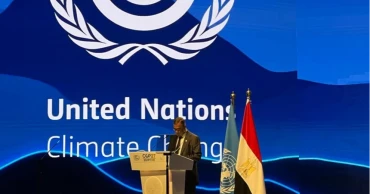COP27
COP27: How will UN climate deal on loss and damage work?
The decision Sunday by nations around the world to establish a fund to help poor countries hit hard by a warming planet was one of the most significant since U.N. climate talks began 30 years ago.
It was an unequivocal confirmation that poor countries, with limited resources, are being most impacted by extreme weather events like floods, heat waves and storms and, at least at some level, industrialized nations that have done the most to contribute to climate change have a responsibility to help.
While government leaders, environmentalists and activists celebrated plans for such a fund, there are many outstanding questions, ranging from how it will work to long-term repercussions. Here is a look at the development of the idea of “loss and damage,” the term it’s given in climate negotiations, and what we know about the fund.
Read more: UN climate deal: Calamity cash, but no new emissions cuts
HISTORY
In the early 1990s, the Alliance of Small Island States, a group of low-lying coastal and small island countries, began calling for the establishment of a loss and damage fund as the United Nations was creating a framework to deal with climate change on an international level.
Since then, the idea has always been a part of annual U.N. climate summits. However, it was often talked about on the margins of negotiations, something developing nations and activists would push for while many rich nations used their weight to squash the idea. For the first time, at this year’s COP27 it was included in the agenda and became the centerpiece of discussions.
WHO WILL FUND IT?
The fund will initially draw on contributions from developed countries and other private and public sources, such as international financial institutions, with an option for other major economies to join down the line.
The final text points to “identifying and expanding sources of funding,” something the EU, the U.S. and others had pushed for during negotiations, suggesting that nations that are both high-polluting and considered developing under the criteria, should also pay into the fund.
During the talks, China said money for the new fund should come from developed countries, not them. But there’s precedence for China to voluntarily pay into climate funds, if the U.S. does too.
When the Obama administration pledged $3 billion to the Green Climate Fund in 2014, China also paid $3.1 billion for the fund.
More details of who pays will be decided by a committee that plans to get the fund going within a year.
Read more: UN climate talks drag into extra time with scant progress
WHO WILL GET MONEY?
The deal says the fund will assist “developing countries that are particularly vulnerable to the adverse effects of climate change," though there will be room for middle-income countries that are severely affected by climate disasters to also get paid.
Pakistan, which was devastated by flooding that put a third of the country underwater, or Cuba, recently battered by Hurricane Ian, could be eligible.
How the loss and damage fund will fit in with "other institutions, agencies that are out there doing humanitarian work, helping people rebuild, dealing with migration and refugee crises, dealing with food security, water security” will need to be worked out, said David Waskow, the World Resources Institute international climate director.
Those details will also be hammered out by the committee in the coming year.
REBUILDING TRUST
Beyond just financial help, setting up the fund is seen as a huge step forward, but how it's ultimately viewed will depend in part on how fast it can be set up.
In the closing session Sunday, Antigua's Lia Nicholson said the transitional committee should be set up immediately and given clear mandates.
“This loss and damage fund must become the lifeboat that we need it to be,” she said.
There is a credibility gap because of past broken promises.
In 2009, rich nations agreed to provide $100 billion a year to help developing countries transition to green energy systems and adapt to climate change. However, to date, that initiative has never been fully funded.
Read more: Time running out for climate negotiators over loss and damage
REPERCUSSIONS
One of the main reasons that rich nations long opposed such a loss and damage fund was the fear that it would open then up to long-term liability. Despite passage, that concern is very much still at play, as evidence by how negotiators made sure the language of the fund didn’t say “liability” and that contributions were voluntary.
Despite those caveats, the establishment of such a fund could have repercussions, both legal and symbolic, in climate circles and beyond. For example, several Pacific Island nations have been pushing for the International Court of Justice to consider climate change. They argue that international laws must be strengthened to protect their rights in the case that their lands are engulfed by rising seas. The establishment of a loss and damage fund could bolster those arguments.
3 years ago
UN climate deal: Calamity cash, but no new emissions cuts
For the first time, the nations of the world decided to help pay for the damage an overheating world is inflicting on poor countries, but they finished marathon climate talks on Sunday without further addressing the root cause of those disasters — the burning of fossil fuels.
The deal, gaveled around dawn in this Egyptian Red Sea resort city, established a fund for what negotiators call loss and damage.
It was a big win for poorer nations which have long called for money — sometimes viewed as reparations — because they are often the victims of climate-worsened floods, droughts, heat waves, famines and storms despite having contributed little to the pollution that heats up the globe.
It has also long been called an issue of equity for nations hit by weather extremes and small island states that face an existential threat from rising seas.
“Three long decades and we have finally delivered climate justice,” said Seve Paeniu, the finance minister of Tuvalu. “We have finally responded to the call of hundreds of millions of people across the world to help them address loss and damage.”
Read more: COP27: Despite lack of progress at climate talks, veteran activists nurture hope
Pakistan’s environment minister, Sherry Rehman, said the establishment of the fund “is not about dispensing charity.”
“It is clearly a down payment on the longer investment in our joint futures,” she said, speaking for a coalition of the world’s poorest nations.
Antigua and Barbuda’s Molwyn Joseph, who chairs the organization of small island states, described the agreement as a “win for our entire world.”
“We have shown those who have felt neglected that we hear you, we see you, and we are giving you the respect and care you deserve,” he said.
The deal followed a game of chicken, with nations that supported the fund also signaling they would walk away if there was any backsliding on language on the need to slash greenhouse gas emissions.
Early Sunday morning, delegates approved the compensation fund but had not dealt with the contentious issues of an overall temperature goal, emissions cutting and the desire to target all fossil fuels for phase down. Through the wee hours of the night, the European Union and other nations fought back what they considered backsliding in the Egyptian presidency’s overarching cover agreement and threatened to scuttle the rest of the process.
Read more: CSOs express dissatisfaction on the outcome of COP27
The package was revised again, removing most of the elements Europeans had objected to but adding none of the heightened ambition they were hoping for.
“What we have in front of us is not enough of a step forward for people and planet,” a disappointed Frans Timmermans, executive vice president of the European Union, told his fellow negotiators. “It does not bring enough added efforts from major emitters to increase and accelerate their emissions cuts.
“We have all fallen short in actions to avoid and minimize loss and damage,” Timmermans said. “We should have done much more.”
Germany’s Foreign Minister Annalena Baerbock likewise voiced frustration.
“It is more than frustrating to see overdue steps on mitigation and the phase-out of fossil energies being stonewalled by a number of large emitters and oil producers,” she said.
The agreement includes a veiled reference to the benefits of natural gas as low emission energy, despite many nations calling for a phase down of natural gas, which does contribute to climate change.
While the new agreement doesn’t ratchet up calls for reducing emissions, it does retain language to keep alive the global goal of limiting warming to 1.5 degrees Celsius (2.7 degrees Fahrenheit). The Egyptian presidency kept offering proposals that harkened back to 2015 Paris language which also mentioned a looser goal of 2 degrees. The world has already warmed 1.1 degrees (2 degrees Fahrenheit) since pre-industrial times.
Read more: COP27: Rich countries couldn’t agree yet on loss and damage funding for vulnerable nations
Nor did the final deal expand on last year’s call to phase down global use of “unabated coal” even though India and other countries pushed to include oil and natural gas in language from Glasgow. That too was the subject of last minute debate, especially upsetting Europeans.
Last year’s climate talks president chided the summit leadership for knocking down his efforts to do more to cut emissions with a forceful listing of what was not done.
“We joined with many parties to propose a number of measures that would have contributed to this emissions peaking before 2025, as the science tells us is necessary. Not in this text,” the United Kingdom’s Alok Sharma said emphasizing the last part. “Clear follow through on the phase down of coal. Not in this text. A clear commitment to phase out all fossil fuels. Not in this text. And the energy text weakened in the final minutes.”
And in his remarks to negotiators, U.N. climate chief Simon Stiell, who hails from Grenada, called on the world “to move away from fossil fuels, including coal oil and gas.”
However, that fight was overshadowed by the historic compensation fund.
“Quite a few positives to celebrate amidst the gloom and doom” of not cutting emissions fast enough to limit warming to 1.5 degrees, said climate scientist Maarten van Aalst of the Red Cross Red Crescent Climate Center, which responds to climate disasters.
It’s a reflection of what can be done when the poorest nations remain unified, said Alex Scott, a climate diplomacy expert at the think tank E3G.
“I think this is huge to have governments coming together to actually work out at least the first step of ... how to deal with the issue of loss and damage,” Scott said. But like all climate financials, it is one thing to create a fund, it’s another to get money flowing in and out, she said. The developed world still has not kept its 2009 pledge to spend $100 billion a year in other climate aid — designed to help poor nations develop green energy and adapt to future warming.
Next year’s talks will also see further negotiations to work out details of the new loss and damage fund, as well as review the world’s efforts to meet the goals of the Paris accord, which scientists say are slipping out of reach.
According to the agreement, the fund would initially draw on contributions from developed countries and other private and public sources such as international financial institutions. While major emerging economies such as China wouldn’t automatically have to contribute, that option remains on the table. This is a key demand by the European Union and the United States, who argue that China and other large polluters currently classified as developing countries have the financial clout and responsibility to pay their way.
The fund would be largely aimed at the most vulnerable nations, though there would be room for middle-income countries that are severely battered by climate disasters to get aid.
Martin Kaiser, the head of Greenpeace Germany, described the agreement on a loss and damage as a “small plaster on a huge, gaping wound.”
“It’s a scandal that the Egyptian COP presidency gave petrostates such as Saudi Arabia space to torpedo effective climate protection,” he said.
Many climate campaigners are concerned that pushing for strong action to end fossil fuel use will be even harder at next year’s meeting, which will be hosted in Dubai, located in the oil-rich United Arab Emirates.
3 years ago
COP27: Despite lack of progress at climate talks, veteran activists nurture hope
It’s a desert, where little grows. It’s a climate conference, where water is scarce inside buildings and out, lines are long, tempers are short, meetings go late and above all progress comes in one-drop drips.
Yet hope springs forth in the strangest places.
Not in the naïve new face, but in the hearts and minds of veteran activists and officials, who have gone through this frustrating sleep-depriving exercise, not once or twice but numerous times.
And it blooms in a odd metal “tree” sculpture in a center square here at the United Nations climate summit in Egypt. People write their hopes on green paper leaves.
“Hope is the only meaning (sic) that makes us ALIVE!” Mohamed Ageez, an Egyptian youth activist wrote.
Former U.S. Vice President Al Gore looks at more than 30 years of climate change efforts and sees hope in progress and change. United Nations Environment Programme Director Inger Andersen and The Nature Conservancy Chief Scientist Katharine Hayhoe see it in all the people in the halls working hard.
Read: COP27: Rich countries couldn’t agree yet on loss and damage funding for vulnerable nations
And Christiana Figueres, the former U.N. climate secretary who helped forge the 2015 Paris agreement and then started a non-profit called Climate Optimism, sees hope not as a noun but an action verb.
“Hope is a verb with its sleeves rolled up,” Figueres told The Associated Press, quoting poet David Orr. “I think of hope and optimism as being very active and in fact being precisely the reason why we roll up our sleeves.”
Asked how he doesn’t despair after seeing heat-trapping emissions rising year after, Gore told the AP: “Despair is a big word. You know, they used to say denial ain’t just a river in Egypt. Here we are in Egypt and despair ain’t just a tire in the trunk. It’s a real factor. But we also have the basis for hope.”
He pointed to several political wins this year.
“In August, the U.S. passed the biggest climate legislation in history,” Gore said. “In September, the people of Australia made a historic change and agreed to become part of the leadership in the world toward renewable energy. And then in October, just days ago, the people of Brazil made a decision to stop destroying the Amazon and start fighting the climate crisis.”
“When people feel vulnerable to climate despair, I urge them to look at the real progress that is being made.”
Read: CSOs express dissatisfaction on the outcome of COP27
Whenever United Nations environment chief Andersen feels down in these meetings she takes note of what’s happening all around her in the pavilions and offices: “In these halls, you will see people huddling over solutions over networking, saying ‘Here’s what we did. Maybe you can do that’.”
Climate scientist Hayhoe finds hope in the same place.
“So when people say it was a complete failure and there’s no hope, I say, just look around at every single face here,” Hayhoe said. “There are tens of thousands of faces here, and every single one of them just about wants to change the world.”
That tree of hope?
Gone.
It’s been moved away from negotiations to the “green zone,” far away from negotiators.
3 years ago
Time running out for climate negotiators over loss and damage
Global climate talks approached crunch time on Friday, the final scheduled day of negotiations that are expected to go past their deadline as chances of a deal still looked unclear.
The UN Secretary-General António Guterres flew to Sharm El-Sheikh on Friday after attending the G-20 meeting.
Addressing the ministers engaged in the final negotiations, the UN chief said that the difference between North and South is very clear.
This division has become whetted between developed and rapidly developing countries. But now it's time to stop the blame game, the UN chief added.
He called on all countries to act on three urgent issues -- loss and damage to restore lost hope and to reach an acceptable agreement with developed countries on financing. In this context, he said, the time to talk about loss and damage is over. Now it's time to work.
"We are witnessing the horror of loss and damage all over the world. There is no way to deny it. So a decision on this issue must be taken here at the last meeting."
Injustice cannot continue to countries that are emitting less carbon and struggling to survive, he said. Now is the time to show compassion to them.
In climate negotiations, loss and damage refers to the idea that rich nations, which have historically done the most to contribute to climate change, should compensate the developing countries most impacted.
Read more: COP27: Bangladesh wants developed countries to deliver on $100 billion promise
Limiting global warming to 1.5C is not just a goal, it is the key to saving the people of the world.
Therefore, the 27th Climate Conference decision must confirm the commitment in this matter as proof of political will. We want the Climate Solidarity Act. This allows developed countries to take the lead in reducing carbon emissions. International financial institutions must accelerate the financing of renewable energy. This is essential to achieve the 1.5-degree target.
The UN Secretary-General also said that countries need to be more proactive in the question of financing. Developing countries must provide $100 billion annually and an acceptable roadmap is needed to scale up adaptation financing.
Saber Hossain Chowdhury Mp, a member of the Bangladesh delegation and president of the Parliamentary Standing Committee on Environment, Forestry and Climate Change, told UNB that although progress has been made on many issues, progress is still lagging behind on complex issues such as reducing carbon emissions, loss and damage and finance.
He said the most surprising thing is that the results of the speeches given by high-level world leaders on November 7 and 8 are not beingreflected even in the final meeting at the ministerial level.
He also said that the United Nations and the host country are seeking reflection of that moral goodwill in the last meeting of the ministerial level to bring out effective and fruitful decisions from the conference. In this regard, the president of the 27th climate conference, the foreign minister of Egypt is talking separately with the ministers of developed and developing countries.
They are discussing to reach an agreement on complex issues. But not a single positive reflection of this discussion can be seen in the ministerial level meeting.
The discussion on the mitigation work program to reduce carbon emissions to limit the global temperature rise to 1.5 degrees Celsius by 2030 has not reached the desired level. The adaptation issue is caught in the process of nowhere. No consensus has been reached so far on financing. The ministers are reluctant to take a political decision on loss and damage, he added.
He said that the issue of assistance to the countries affected by climate change has been put on the agenda of this climate conference by the host country Egypt for the first time. It came to the agenda for the first time mainly due to the pressure of African countries. Now the entire LDC countries are speaking on this issue. But developed countries are opposing it, he added.
Read more: “We had enough of your promises and we need these words to be put into action now”
3 years ago
COP27: Rich countries couldn’t agree yet on loss and damage funding for vulnerable nations
Countries attending this year’s Climate Change Conference of the Parties (COP27) are yet to decide on some important issues, including financing for vulnerable countries under the “Loss and Damage” programme.
Talking to UNB, Ziaul Haque, a representative of Bangladesh at the conference, said that the developed countries have set 2024 for finalising a structure of the “Loss and Damage” programme.
“We couldn’t agree on the primary issue, which is financing for vulnerable countries over climate change-induced losses. No decision has been taken on the length of the mitigation programme to reduce carbon emissions either. I don’t think we’ll gain much at this year’s conference, as the rich countries are busy reaching a consensus on old issues,” Ziaul said.
Read: COP27: Momen thanks Egypt for focusing on "loss and damage" issue
Ziaul added that the COP27 participants are currently preparing the outlines of Global Goal on Adaptation and Loss and Damage programme so that decisions can be taken on them in the next conference.
“Although the issue of adapting to climate change is widely discussed in each conference, no one provides any money as there is a lack of policies. That’s why we’re working on Global Goal on Adaptation. Hopefully the goal will be finalised in the next conference and then we’ll get the money,” added Ziaul.
Talking to various Bangladeshi representatives at COP27, UNB learned that there is a chance for the Glasgow-Sharm el Sheikh Work Program on Mitigation to get the final nod. Climate vulnerable countries are pushing for this work program.
The work programme will list which countries need to check carbon emissions first. Besides, a synthesis report on how much carbon is being emitted will also be prepared till 2030 under the programme.
Read: COP27: Bangladesh urges developed nations to double provision of adaptation finance by 2025
A draft document consisting of 38 paragraphs has been published at COP27 in this regard. The participants are now trying to reduce the number of paragraphs to make it more compact.
At COP27, the staff-level discussions have ended and the minister-level discussions are currently in place. The conference will end on Friday, when the Sharm el-Sheikh decision will be taken as an agreement approved by the ministers of the participating countries.
3 years ago
COP27: Momen thanks Egypt for focusing on "loss and damage" issue
Foreign Minister Dr A K Abdul Momen thanked the Egyptian Presidency of COP27 for having included the critical issue of ‘loss and damage’ as part of the Conference agenda.
He conveyed this during his meeting with the Egyptian Foreign Minister and COP27 President Sameh Shoukry in Sharm El Sheikh on Tuesday.
Foreign Minister Momen hoped that the Conference would be able to come up with a concrete deliverable on financing for loss and damage.
The Egyptian Foreign Minister expressed his interest in visiting Bangladesh in the near future.
The two Ministers agreed to strengthen Parliamentary engagements between the two sides.
read more: COP27: Bangladesh urges developed nations to double provision of adaptation finance by 2025
Foreign Minister Momen also met with the US President’s Special Envoy on Climate Change John Kerry to discuss possible outcomes on loss and damage.
They had a combined meeting later with other representatives from V20 (Vulnerable Twenty Group of Finance Ministers) currently led by Ghana.
The US Special Envoy thanked Bangladesh for joining the Global Methane Pledge and referred to certain financing windows available for taking action on methane reduction.
Minister Momen stressed the need for such support in agriculture, livestock and waste management sectors in Bangladesh.
3 years ago
COP27: Bangladesh urges developed nations to double provision of adaptation finance by 2025
Environment, Forest and Climate Change Minister Shahab Uddin has urged developed countries to at least double their collective provision of adaptation finance by 2025, as agreed upon during COP26 in Glasgow, and to provide support for the implementation of National Adaptation Plan (NAP).
The environment minister made the call while speaking at the two-day high-level segment of COP27 conference in Egypt’s Sharm El-Sheikh on Tuesday.
“The countries that are most responsible for greenhouse gas emission should share responsibility for protecting the people vulnerable to the impacts of climate change. We want to see the developed countries keep their commitments, providing 100 billion US dollars each year – major portion of which should come from public funds dedicated to climate change adaptation,” he said.
Read: COP27: FM calls for collective action to mainstream climate-induced migration in negotiations
He also said, “At COP27, it’s essential that we make progress in addressing the gap that exists between nationally determined contributions and emission reductions required by science to keep 1.5-degree Celsius target alive, including finalising the mitigation work programme as necessary to reduce global carbon emission by 45% by 2030.”
“Bangladesh is an innocent victim of climate change as it contributes less than 0.48% of global emissions,” he added.
Bangladesh has always been highly susceptible to climate change and climate-induced disasters due to its unique geographical setting, said the minister. “Studies show that about 12-17% of the country, an area larger than many small island countries, will be submerged due to sea level rise by this century.”
On October 31, 2022, Bangladesh submitted its National Adaptation Plan to United Nations Framework Convention on Climate Change (UNFCCC), he said, adding: “In our NAP, we have identified 113 actions for 8 vulnerable sectors. USD 230 billion will be required to implement the actions over the next 27 years (2023-2050). We need dedicated, additional financial resources for effective implementation of adaptation actions identified in the National Adaptation Plan.”
Read: COP27: Bangladesh among first recipients of Global Shield financial support
The country has established a national climate finance mechanism, “Bangladesh Climate Change Trust Fund” from its own resources and allocated USD 490 million that supports more than 850 projects for making the country climate resilient, he said.
“Apart from this, the climate-relevant allocation in our Annual Development Plan has increased by two and a half times over the last eight years – from USD 1.4 billion to more than USD 3.1 billion – for climate adaptation and resilience-building through construction of embankments, cyclone shelters, development of stress tolerant crop varieties and coastal afforestation and reforestation,” the environment minister said.
3 years ago
COP27: No decision yet on compensation for climate vulnerable countries
No decision has been made yet over getting compensation for climate vulnerable countries, said Environment, Forest and Climate Change Minister Shahab Uddin.
“No decision has been made yet regarding the compensation to the vulnerable countries including Bangladesh, though Bangladesh and other countries are still hopeful that a decision about financial assistance from the developing countries will come,” he told UNB.
COP27 is taking place in Egypt from 6-18 November where Bangladesh is playing a crucial role as one of the top actors on behalf of the vulnerable countries that are desperate to get funds to tackle the impacts of climate change.
Due to climate change, natural disasters are occurring frequently around the globe. Owing to the impact of it, people not only experience the infrastructural damage, but also lose everything including income sources and crops, he said.
Because of increasing salinity, access to safe water is becoming difficult in coastal areas. As a result, people have to collect water from remote places, wasting working hours, he added.
Besides, the fishermen failed to catch fish during a certain period of time due to frequent depression in the Bay, forcing them to change their profession, said the minister.
Meanwhile, people are becoming homeless due to the riverbank erosion while people who depend on forests lose their work due to the heat wave, he said.
Replying to a question, the minister said “Loss and damage financing is on the agenda for discussion at the COP conference, and Bangladesh and other countries have welcomed the initiative. How the financing will be made, will be fixed through a framework, and it will take time.”
Ziaul Haque, a member of the Bangladesh team, said that they are seeking a green climate fund or adaptation fund under the loss and damage formula, but the rich countries are not interested in it.
Also read: Adapting to climate change is the main focus of COP27: Info Minister
“They give money, but they do not give that as compensation…we just want funds,” he said.
Md Shamsuddoha, a climate expert observing the climate conference, told UNB that it should be fixed what is loss and damage before financing.
“Damaging infrastructure during natural disasters is not a loss and damage, but the impact that natural disasters have on the livelihood of the local community would come under loss and damage by which people are directly affected.”
Syeda Rizwana Hasan, chief executive of Bangladesh Environmental Lawyers Association (Bela), said that the developing countries had promised to provide $100 billion as green fund, but they are now showing the Russia-Ukraine war as an excuse.
“It’s not right. As a vulnerable country, the more we wait to get compensation, the more our losses will increase. We should take measures for quick preparations to overcome the damages.”
3 years ago
Save our cities and people: DNCC mayor at COP27
Climate change is seriously disrupting city life across the globe, Dhaka North City Corporation Mayor Md Atiqul Islam said Monday, urging everyone to work together to save cities and their people.
No one is safe until everyone is safe, he added.
He was speaking at the Blue Zone of the 27th Conference of the Parties to the UN Framework Convention on Climate Change (COP27) China Pavilion with C40 – a network of mayors of nearly 100 world-leading cities collaborating to deliver the urgent action needed right now to confront the climate crisis – in Egypt's Sharm El Sheikh.
Atiqul spoke to the mayors of Chinese cities and representatives of other South-South cities.
The Blue Zone is a UN-managed space where negotiations are hosted and, to enter, all attendees must be credited by the UN Framework Convention on Climate Change (UNFCCC) Secretariat.
This year there are 156 pavilions inside the Blue Zone, double the amount at Glasgow. Many UN agencies, countries and regions are being represented.
Atiqul said: "Heatwaves, flooding, cyclones and salinity are making people leave their homes for cities in search of a living and livelihood. As mayors, we have responsibilities towards our cities and their people."
Read more: Around 6500 become climate refugees in Bangladesh every year: Momen at COP27
The vital United Nations climate talks, billed as one of the last chances to stave off climate breakdown, are taking place from November 6-18 amid a multitude of competing crises, including the war in Ukraine, high inflation, food shortages and an energy crunch.
Negotiators are spending frantic days discussing whether to formally consider the issue of loss and damage, or reparations, to vulnerable nations suffering from climate change, and the issues, which weighed on the talks for years at COP27.
Read more: Bangladesh wants mechanism to address loss and damage financing by 2024
3 years ago
COP27: Bangladesh among first recipients of Global Shield financial support
The Vulnerable Twenty (V20) Group of Finance Ministers of the Climate Vulnerable Forum (CVF) that includes 58 climate vulnerable economies, and the Group of Seven (G7) on Monday (November 14, 2022) officially launched the Global Shield against Climate Risks – an initiative for pre-arranged financial support designed to be quickly deployed in times of climate disasters.
The first recipients of Global Shield packages – called ‘Pathfinder Countries’ – include Bangladesh, Costa Rica, Fiji, Ghana, Pakistan, the Philippines and Senegal, according to a message UNB received from COP27 being held in Egypt’s Sharm El-Sheikh.
The Global Shield will start its implementation immediately after COP27.
Initial contributions include around EUR 170 million from Germany and more than EUR 40 million from other countries.
Also read: Climate Change: IOM DDG calls for redoubling efforts ahead of COP 27
In addition, a broad coalition of countries, multilateral institutions, non-state and private sector partners has underlined their full institutional commitment to the Global Shield.
Ghana Finance Minister Ken Ofori-Atta, V20 Chair, called this is a path-breaking effort and hoped the funding window will benefit equally compared to the pre-existing structures whose performance remain to be proven.
“Our fiscal space is under constant threat and the inflationary pressures of climate change are closing out our options. As part of our Climate Prosperity Plan to reduce the 98 percent financial protection sinkhole, the Global Shield will play a key role in resourcing financial and social protection packages to protect our economy, our enterprises and our communities,” Ken said.
Ken said the Global Shield is long overdue. “It has never been a question of who pays for loss and damage because we are paying for it – our economies pay for it in lost growth prospects, our enterprises pay for it in business disruption, and our communities pay for it in lives and livelihoods lost.”
Also read: D-8 PTA likely to be operational this year to boost intra-trade
Svenja Schulze, Federal Development Minister of Germany, said that under the German presidency, the G7 have committed to scale-up action and support on loss and damage and to work towards a “Global Shield against Climate Risks”, responding to the V20’s call.
“Germany stands by its responsibility to support poor and vulnerable people and countries in dealing with loss and damage. This launch sends a signal: We have heard the urgency and we are acting. We aim at overcoming differences even in challenging circumstances. Germany wants to be a bridge-builder.”
Henry Kokofu, Special Envoy of the Climate Vulnerable Forum (CVF) Ghana Presidency, said: “This is definitely the start we need, but the more effective we are in innovations like the Shield, the more we have to emphasize that scale matters.”
Recent V20 research found that 98% of the nearly 1.5 billion people in V20 countries do not have financial protection – a massive sinkhole for these countries whose workforce is mainly employed by small and medium enterprises.
Read More: COP27: Bangladesh urges developed countries to double climate financing by 2025
According to this research, V20 countries have lost a total of USD 525 billion to climate impacts since 2000.
As risks of losses and damages from climate change escalate further, the cost of capital and debt have risen to unsustainable levels, especially across climate vulnerable economies.
The Global Shield addresses current weaknesses in the financial protection structure in climate vulnerable economies via pre-arranged finance which disburses quickly and reliably before or just after disasters happen.
It expands instruments of financial protection for governments, communities, businesses, and households, thus, lessening the impact of disasters, making vulnerable economies resilient, safeguarding sustainable development, and protecting lives and livelihoods.
Read More: Bangladesh wins COP27 award for community-led initiative
Germany is providing some EUR 170 million as seed contribution, of which EUR 84 million are core funding to the Global Shield and EUR 85.5 million for related climate risk finance instruments.
Further pledges of core funding to the Global Shield include DKK 35 million (about EUR 4.7 million) from Denmark, EUR 10 million from Ireland, USD 7 million from Canada, and EUR 20 million from France. Further contributions by donors are expected to materialize soon.
The V20 and G7 have decided that it will be steered by the Global Shield High-Level Consultative Group, which includes representatives of the V20, G7, G20, think tanks, civil society, multilateral organizations and the private sector.
A financing structure with three complementary funds forms the foundation of the Global Shield against Climate Risks: the Global Shield Solutions Platform, which builds on InsuResilience Solutions Fund, the Global Shield Financing Facility at the World Bank, and the Climate Vulnerable Forum (CVF) & V20 Joint Multi-Donor Fund.
Read More: What can COP27 do for climate vulnerable countries?
3 years ago



















